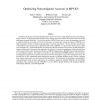Free Online Productivity Tools
i2Speak
i2Symbol
i2OCR
iTex2Img
iWeb2Print
iWeb2Shot
i2Type
iPdf2Split
iPdf2Merge
i2Bopomofo
i2Arabic
i2Style
i2Image
i2PDF
iLatex2Rtf
Sci2ools
132
click to vote
PC
2002
2002
Optimizing noncontiguous accesses in MPI-IO
The I/O access patterns of many parallel applications consist of accesses to a large number of small, noncontiguous pieces of data. If an application's I/O needs are met by making many small, distinct I/O requests, however, the I/O performance degrades drastically. To avoid this problem, MPI-IO allows users to access noncontiguous data with a single I/O function call, unlike in Unix I/O. In this paper, we explain how critical this feature of MPI-IO is for high performance and how it enables implementations to perform optimizations. We first provide a classification of the different ways of expressing an application's I/O needs in MPI-IO--we classify them into four levels, called level 0 through level 3. We demonstrate that, for applications with noncontiguous access patterns, the I/O performance improves dramatically if users write their applications to make level-3 requests (noncontiguous, collective) rather than level-0 requests (Unix style). We then describe how our MPI-I...
Related Content
| Added | 23 Dec 2010 |
| Updated | 23 Dec 2010 |
| Type | Journal |
| Year | 2002 |
| Where | PC |
| Authors | Rajeev Thakur, William Gropp, Ewing L. Lusk |
Comments (0)

